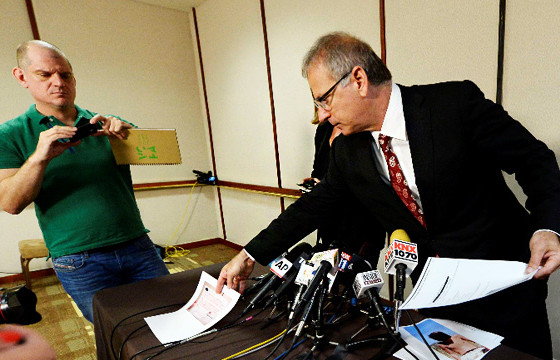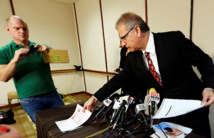The horror-comedy is a return to form for one of Hong Kong's few commercially successful independent directors, boasting typical Chan ingredients of ultra-violence and distinctly local, black humour.
Adapted from an online novel, "The Midnight After" places a group of people in a mini-bus late at night. When the bus emerges from Hong Kong's Lion Rock Tunnel, they find the streets deserted after an unexplained calamity hits the city.
The film is rich with allusions to current events in Hong Kong, and is one of a handful of recent movies tapping into a sense of collective confusion and rising anger over where the territory is headed.
"After Hong Kong joined China, many things have changed in our town," said Chan.
"I follow very closely what is happening, and that's why I included in my film elements that certainly have to do with politics," said the director, speaking to AFP at the 16th Far East Film Festival in the northern Italian city of Udine.
Under an agreement between Britain and China before Hong Kong was returned to Chinese rule in 1997, the "One Country, Two Systems" maxim would see the territory retain its semi-autonomous status and enshrine civil liberties not guaranteed on the mainland.
The mood has soured since 1997. Protest marches are a frequent sight amid perceived erosions to Hong Kong's status, a sense of declining press freedom and fears that Beijing will row back on promises that the city -- whose current chief executive is appointed by a pro-Beijing committee -- will see a transition to universal suffrage by 2017.
This has been coupled with a rising tide of anti-mainland Chinese sentiment as Hong Kong experiences an influx of about 40 million visitors from across the border every year, pressuring services and space in a territory of seven million.
Chan references both issues in "The Midnight After", which makes some subtle jibes at the leadership of unpopular Hong Kong Chief Executive Leung Chun-ying and touches on a perceived marginalisation of Hongkongers within their own city, where a soaring property market is out of reach for many.
- Changing audience -
Chan, 55, has long been one of his city's most socially aware directors, his acclaimed Hong Kong trilogy of "Made In Hong Kong" (1997), "The Longest Summer" (1998) and "Little Cheung" (2000) examining the effects the handover was having on the lives of everyday people.
Chan said audiences in Hong Kong have become increasingly politicised since 1997, when his "Made in Hong Kong" did not chime as well with its audience at the box office as his current release.
"We were afraid that when people understood this film had to do with politics, then it might be ignored. But there's been a great reaction to the film, many debates, many opinions raised by it. The change was not in my approach, the change was in the audience."
The Far East Film Festival is the second international event "The Midnight After" has played after it made its world premiere at the Berlin International Film Festival in February. The makers are currently in discussions over international distribution.
"Other audiences might not understand everything that is going on in the film but we hope it can help inform them about our city," said Chan, who is planning a sequel.
"The Midnight After" is one of a number of current Hong Kong productions steeped in nostalgia for a city - or even a society - film-makers feel is fading from view.
Pang Ho-cheung's yet-to-be-released drama "Aberdeen" is another, and one that highlights through its characters a collective confusion about what the future will hold.
The bawdy comedy "Golden Chickensss" makes constant reference to the effects "mainlandisation" is having on the city in which it is set.
Chan welcomes the trend and hopes the city's next generation of movie-makers will continue to follow suit.
"Young film-makers all want to be commercial straight away," he said.
"But I am saying to them, make a short film and tell your stories first. Don't rush. Talk about people before you rush around and make action films."
-------------------------------------------------------------------
Adapted from an online novel, "The Midnight After" places a group of people in a mini-bus late at night. When the bus emerges from Hong Kong's Lion Rock Tunnel, they find the streets deserted after an unexplained calamity hits the city.
The film is rich with allusions to current events in Hong Kong, and is one of a handful of recent movies tapping into a sense of collective confusion and rising anger over where the territory is headed.
"After Hong Kong joined China, many things have changed in our town," said Chan.
"I follow very closely what is happening, and that's why I included in my film elements that certainly have to do with politics," said the director, speaking to AFP at the 16th Far East Film Festival in the northern Italian city of Udine.
Under an agreement between Britain and China before Hong Kong was returned to Chinese rule in 1997, the "One Country, Two Systems" maxim would see the territory retain its semi-autonomous status and enshrine civil liberties not guaranteed on the mainland.
The mood has soured since 1997. Protest marches are a frequent sight amid perceived erosions to Hong Kong's status, a sense of declining press freedom and fears that Beijing will row back on promises that the city -- whose current chief executive is appointed by a pro-Beijing committee -- will see a transition to universal suffrage by 2017.
This has been coupled with a rising tide of anti-mainland Chinese sentiment as Hong Kong experiences an influx of about 40 million visitors from across the border every year, pressuring services and space in a territory of seven million.
Chan references both issues in "The Midnight After", which makes some subtle jibes at the leadership of unpopular Hong Kong Chief Executive Leung Chun-ying and touches on a perceived marginalisation of Hongkongers within their own city, where a soaring property market is out of reach for many.
- Changing audience -
Chan, 55, has long been one of his city's most socially aware directors, his acclaimed Hong Kong trilogy of "Made In Hong Kong" (1997), "The Longest Summer" (1998) and "Little Cheung" (2000) examining the effects the handover was having on the lives of everyday people.
Chan said audiences in Hong Kong have become increasingly politicised since 1997, when his "Made in Hong Kong" did not chime as well with its audience at the box office as his current release.
"We were afraid that when people understood this film had to do with politics, then it might be ignored. But there's been a great reaction to the film, many debates, many opinions raised by it. The change was not in my approach, the change was in the audience."
The Far East Film Festival is the second international event "The Midnight After" has played after it made its world premiere at the Berlin International Film Festival in February. The makers are currently in discussions over international distribution.
"Other audiences might not understand everything that is going on in the film but we hope it can help inform them about our city," said Chan, who is planning a sequel.
"The Midnight After" is one of a number of current Hong Kong productions steeped in nostalgia for a city - or even a society - film-makers feel is fading from view.
Pang Ho-cheung's yet-to-be-released drama "Aberdeen" is another, and one that highlights through its characters a collective confusion about what the future will hold.
The bawdy comedy "Golden Chickensss" makes constant reference to the effects "mainlandisation" is having on the city in which it is set.
Chan welcomes the trend and hopes the city's next generation of movie-makers will continue to follow suit.
"Young film-makers all want to be commercial straight away," he said.
"But I am saying to them, make a short film and tell your stories first. Don't rush. Talk about people before you rush around and make action films."
-------------------------------------------------------------------









 Home
Home Politics
Politics











